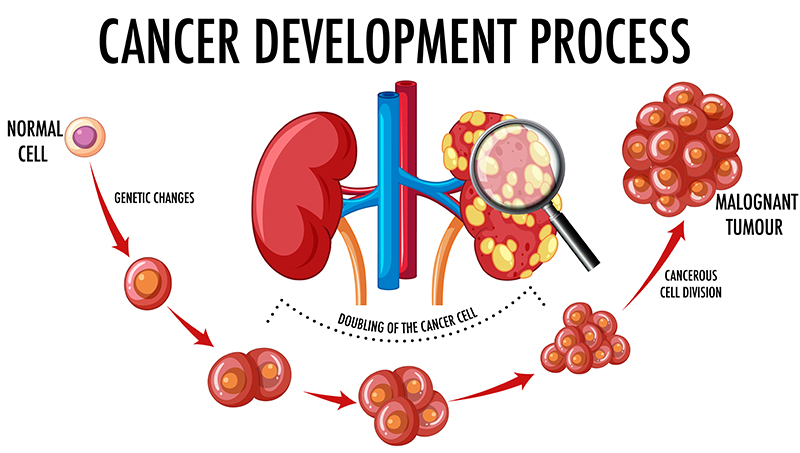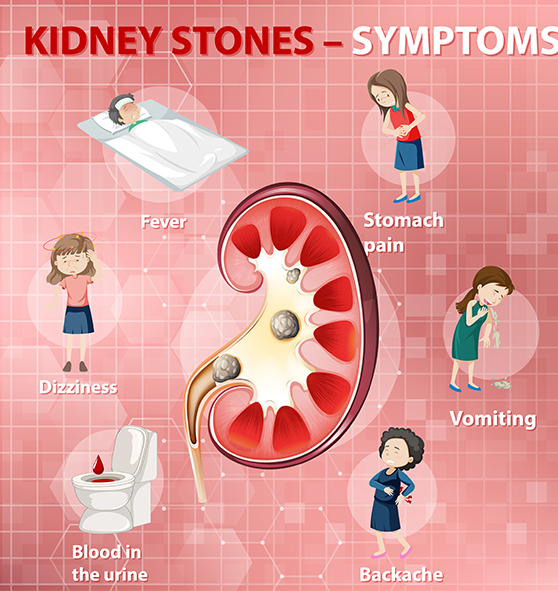
Kidney cancer, also known as renal cell carcinoma (RCC), is a type of cancer that originates in the kidneys. It can develop at different rates and stages, which significantly influences the treatment plan and prognosis. Understanding the stages of kidney cancer is crucial for both patients and healthcare providers to make informed decisions about treatment options.
What Are the Stages of Kidney Cancer?
Kidney cancer is typically classified into four main stages (Stage I to Stage IV), depending on the size of the tumor and how far it has spread from the kidneys. The stage of the cancer at diagnosis determines the type of treatment and the overall prognosis.

Stage 1: Early-Stage Kidney Cancer
• Tumor size: The tumor is confined to the kidney and is smaller than 7 cm in diameter.
• Spread: At this stage, cancer has not spread beyond the kidney.
• Prognosis: Stage 1 kidney cancer has a relatively high survival rate, with most patients experiencing favourable outcomes after treatment.
Stage 2: Localized Growth
• Tumor size: The tumor is larger than 7 cm in diameter but still confined to the kidney.
• Spread: Cancer has not spread to nearby lymph nodes or other organs.
• Prognosis: Stage 2 kidney cancer still has a high survival rate, but the larger tumor size may require more extensive treatment options, such as surgery to remove the kidney (nephrectomy).
Stage 3: Regional Spread
• Tumor size: The tumor may have spread beyond the kidney but is still limited to the surrounding tissue or lymph nodes.
• Spread: Cancer may involve nearby blood vessels (renal vein or inferior vena cava) or nearby lymph nodes.
• Prognosis: Treatment is more complex and may involve surgery, targeted therapy, or immunotherapy. The prognosis for stage 3 kidney cancer is generally lower than for earlier stages, but many patients still respond well to treatment.
Stage 4: Advanced Kidney Cancer
• Tumor size: The tumor has spread beyond the kidney to distant organs, such as the lungs, bones, or liver.
• Spread: Cancer has likely spread to distant lymph nodes or other organs.
• Prognosis: Stage 4 kidney cancer is considered metastatic, and treatment focuses on managing the cancer and improving quality of life rather than curing the disease. Options include targeted therapies, immunotherapy, and sometimes surgery or radiation, depending on the extent of spread.
Importance of Staging in Kidney Cancer
Staging is essential for determining the most effective treatment plan. Early-stage kidney cancer can often be treated with surgery alone, offering a chance for a complete cure. However, more advanced stages may require additional treatments, including chemotherapy, radiation therapy, or newer targeted therapies and immunotherapies.
How Kidney Cancer is staged
Staging involves a combination of methods, including:
• Imaging tests: CT scans, MRIs, or ultrasounds are often used to evaluate the tumor's size and whether it has spread to nearby structures or lymph nodes.
• Biopsy: A biopsy may be performed to confirm the diagnosis of cancer and to help determine the cancer's specific characteristics.
• Blood tests: Blood tests may be used to assess kidney function and detect markers that could indicate the presence of cancer.

Conclusion
Understanding the stages of kidney cancer helps patients and their healthcare teams make informed decisions about the most appropriate treatment. Early-stage kidney cancer has a much higher chance of successful treatment and recovery, while more advanced stages may require a combination of therapies. If you or a loved one has been diagnosed with kidney cancer, it’s important to work closely with your medical team to develop a personalized treatment plan based on the cancer’s stage.
For more information on kidney cancer and treatment options, visit My Care India.
You can also explore:
• Kidney Cancer Treatment Options
• Understanding Kidney Cancer Symptoms
• Latest Advances in Kidney Cancer Research





